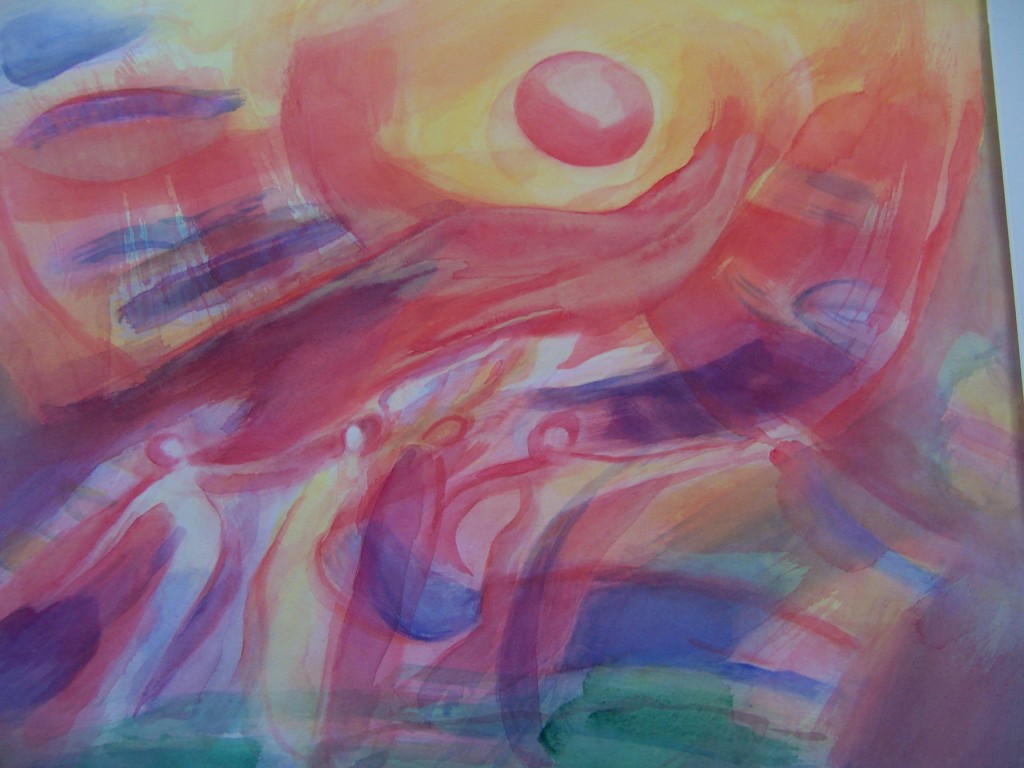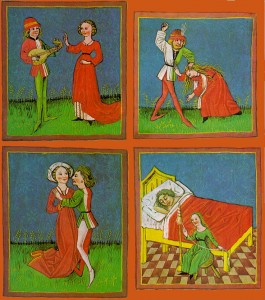CHAPTER 3
Philosophy
Dietary
Exercise Suggested:
(To be undertaken in one week periods)
Foods
consumed within the one sitting are to be consistent in theme with
the characteristic expressions of the temperaments (singly), and not
to be confused within the one meal together. The four sensations are
to be alternated, although the order this is done in is not
important.
Example:
AIRY
SANGUINE
DISHES: Sweet Sensations
Grain: Barley
Sweet
curries (not hot, with fruit in); sweet pies (pumpkin, sweet potato,
fruit, etc.); sweet soups; sweet syrups, desserts, stewed & fresh
fruits; blossoms; beverages; honey; milks & milk products (more
to do with the milk than the cream) etc.
[Note: the
Brothers don't recommend dried processed sugar. Maple syrup, golden
syrup, treacle, honey or dates and raisins etc. are all preferable.]
FIERY
CHOLERIC
DISHES: Spicy and Hot Sensations
Grain: Oats
Mustard;
paprika; chillies; pepper; horseradish; onions, leeks; hot curries; savory dishes in general which awaken the senses extremely.
WATERY
PHELGMATIC:
Fluidic
Dishes
Grain: Wheat
Soups;
stews; casseroles (none of these to be overly tasty, but rather very
bland); pulses; nuts; oils, cream; dumplings, pancakes, bread;
melons; pumpkin; squash; zucchini and juices etc.
EARTHY
MELANCHOLIC
METABOLIZERS: Bitter, Sharp, Tart and Salty Sensations
Grain: Rye
Citrus;
parsnip, turnip; radish; soups & stews (can be salted); Raw Food
Diet; aromatic bitters; bitter herbs: parsley; artichokes; rye
breads: pumpernickel; milk products can be included like sharp
cheeses or unsweetened yoghurts; pickles; vinegar: salad dressings
(not so oily); celery; capers; olives pickled etc.



2 comments:
The Four Temperaments were said to be a result of the four humors.
The word "humor" is a translation of Greek, chymos (literally juice or sap, metaphorically flavor) i.e. a humor is a fluid.
http://en.wikipedia.org/wiki/Humorism
Dr. Steiner explains it thus:
Human beings as we know them in this life are beings of four members. The first, the physical body, they have in common with the mineral world. The first supersensible member, the etheric body, is integrated into the physical and separates from it only at death. There follows as third member the astral body, the bearer of instincts, drives, passions, desires, and of the ever-changing content of sensation and thought. Our highest member, which places us above all other earthly beings, is the bearer of the human ego, which endows us in such a curious and yet undeniable fashion with the power of self-awareness. These four members we have come to know as the essential constituents of a human being.
The way the four members combine is determined by the flowing together of the two streams upon a person's entry into the physical world. In every case, one of the four members achieves predominance over the others, and gives them its own peculiar stamp. Where the bearer of the ego predominates, a choleric temperament results. Where the astral body predominates, we find a sanguine temperament. Where the etheric or life-body predominates, we speak of a phlegmatic temperament. And where the physical body predominates, we have to deal with a melancholic temperament. The specific way in which the eternal and the ephemeral combine determines what relationship the four members will enter into with one another.
A link to Rudolf Steiner's main lecture:
The Four Temperaments
http://wn.rsarchive.org/Lectures/FourTemps/19090304p01.html
Knowledge of the Four Temperaments formed part of Catholic education before it was adopted for use in Waldorf:
THE FOUR TEMPERAMENTS by
REV. CONRAD HOCK
http://angelicum.net/newsroom/the-four-temperaments-by-rev-conrad-hock/
But the Divine is at work in the whole of nature, not only when men pray or converse on the subject of Holy Writ. The Spiritual is an active power in nature. If man prevents the Spiritual from having access to his head because by eating potato food to excess he gives the head too much to do ... well, he may pray, but it will be to no purpose because he has been sidetracked from the Spiritual. That too is something that escapes notice. God did not find the earth as a clod out of which all things were then made; the Divine Power is active everywhere, in every single particle, and it is there that we must seek for its manifestations. But when this is done, the theologians accuse us of materialism!
-Rudolf Steiner
Post a Comment